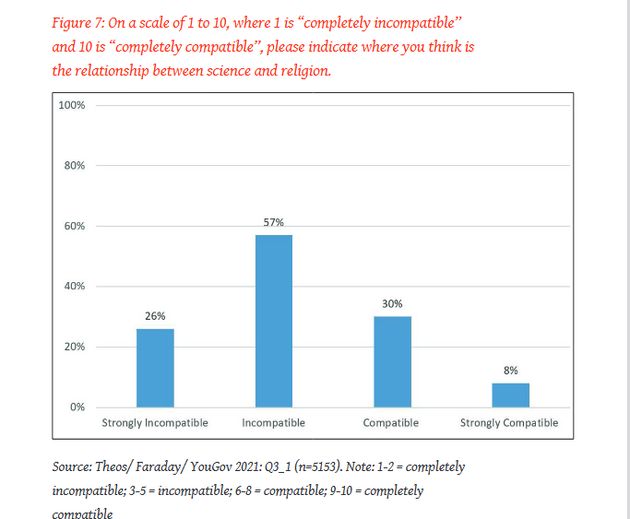A survey published by the Theos think tank also shows that 64% believe that “there are some things that science will never be able to explain”.
![Photo: [link]Chris Panas[/link], Unsplash, CC0.](https://cms.evangelicalfocus.com/upload/imagenes/63aac75840624_chris-panas-zMDpsWWbvUI-unsplashCropped.jpg) Photo: [link]Chris Panas[/link], Unsplash, CC0.
Photo: [link]Chris Panas[/link], Unsplash, CC0.
Theos think tank, along with The Faraday Institute, recently launched a research on public and elite attitudes towards science and religion in the UK, called ‘Science and Religion’: Moving away from the shallow end.
It is a three-year project with the aim of “mapping the landscape of science and religion conflict in the UK, to explore what exactly people are disagreeing about when they disagree about science and religion".
Researchers conducted over a hundred in–depth interviews with leading academics and science communicators, and commissioned a YouGov public opinion poll of 5,153 adults all across UK.
“The contention of this report is that the science and religion debate has been distorted by being viewed primarily through a few narrow lenses, in particular, evolution, the Big Bang, and neuroscience, and because these are ‘conflictual’ lenses, the resulting picture is one of a conflict that the public feels but finds it hard to locate or explain”, says the study.
For the authors, “this is not to deny that there are still tensions and conflicts in the debate. It is, rather, to claim that the debate so far has too often been a ‘shallow end’ one”.
According to the study, 57% of the respondents think that science and religion are incompatible, while 30% say they are compatible.
Men (60%) are more likely than women (55%) to say that science and religion are incompatible. Furthermore, 68% of white respondents think they are incompatible, compared with 48% of those from non- white ethnic groups respondents.

When asked for specific religions, “the perception of hostility between ‘science and religion’ is greater than it is between ‘science and Christianity’ or ‘science and Islam’. In other words, this seems to be a conflict of image rather than substance”.
The study shows that around half of British adults think science and Christianity are incompatible, while just over a third (36%) say they are compatible.
“People hold different views on science and religion, but they also hold them for different reasons. Some people think that science and religion are compatible because modern science has proved religious beliefs true. Others think they are compatible because they have nothing to do with one another”, pointed out Nick Spencer, Senior Fellow at Theos.
Moreover, the research reveals that 46% of respondents agree that “all religions have some element of truth in them”, 49% that “humans are at heart spiritual beings”, and 64% that “there are some things that science will never be able to explain”.
It states that “this debate has been unduly captured by a handful of topics and sometimes, worse, by some of the loudest (and not necessarily best informed) voices”..
“In reality, ‘science and religion’ is about so much more, in large measure because both ‘science’ and ‘religion’ are vast, sprawling, ill-defined categories, both highly relevant to the question of how we live our lives together”, concludes the study.
After the publication of the research, Theos and the Faraday institute have also launched an online survey about science and religion called The science and religion compass.
It is open for anyone who wants to respond. Over 8,000 people have taken part in the survey so far.
You can read the full study here.
[donate]

Las opiniones vertidas por nuestros colaboradores se realizan a nivel personal, pudiendo coincidir o no con la postura de la dirección de Protestante Digital.
Si quieres comentar o